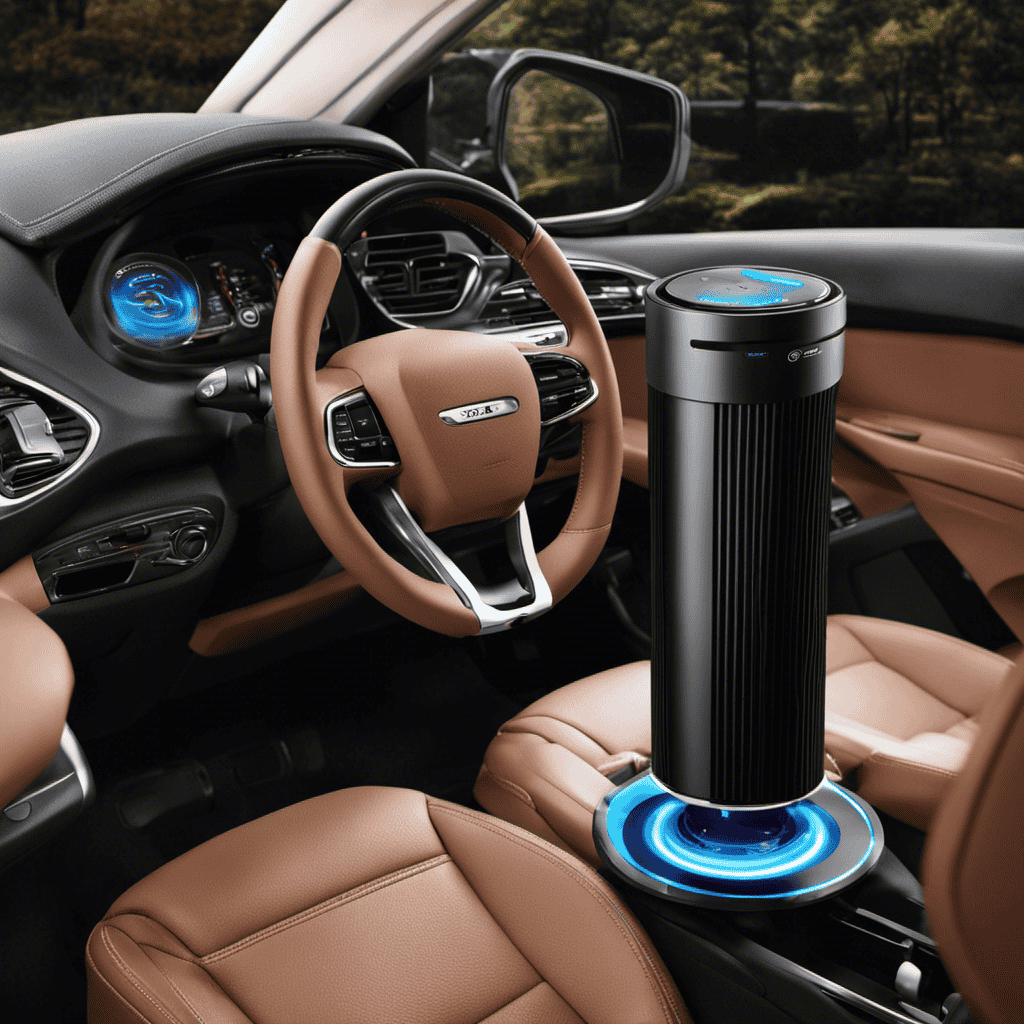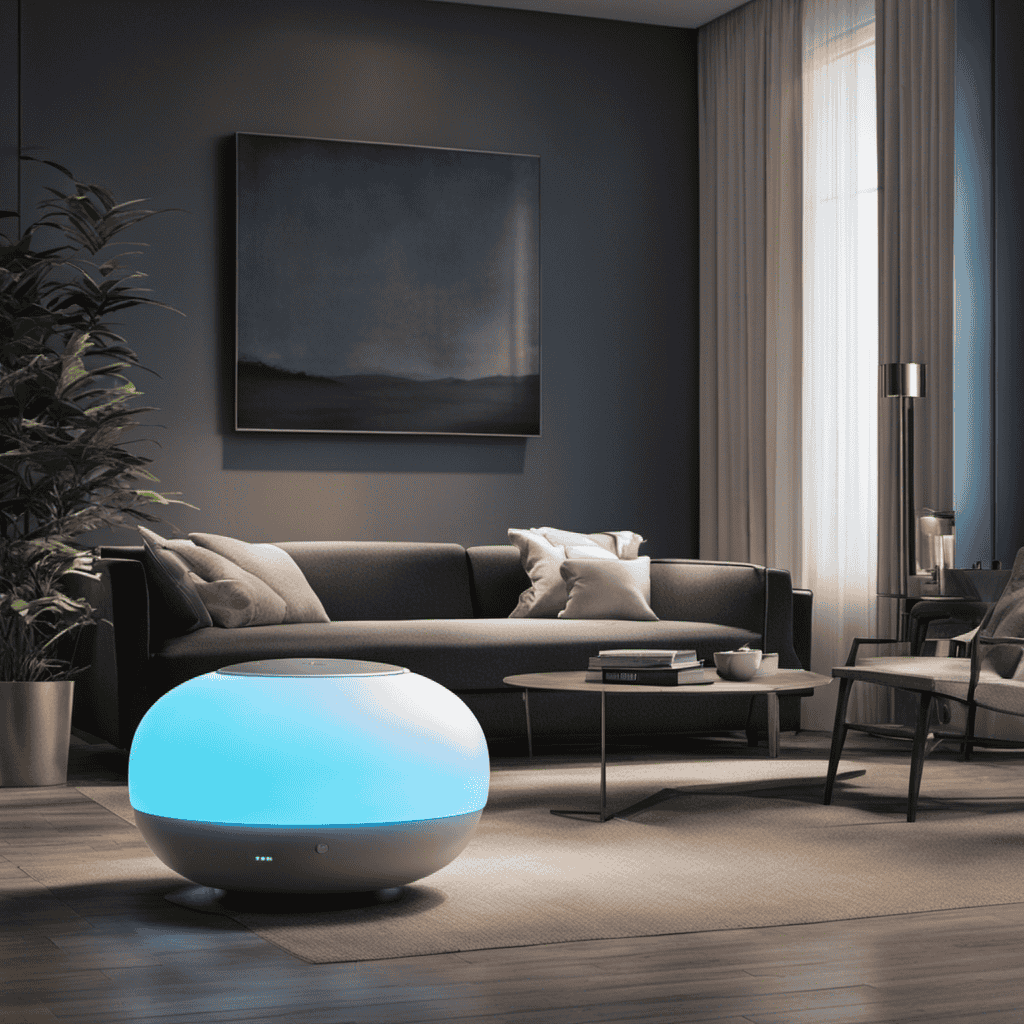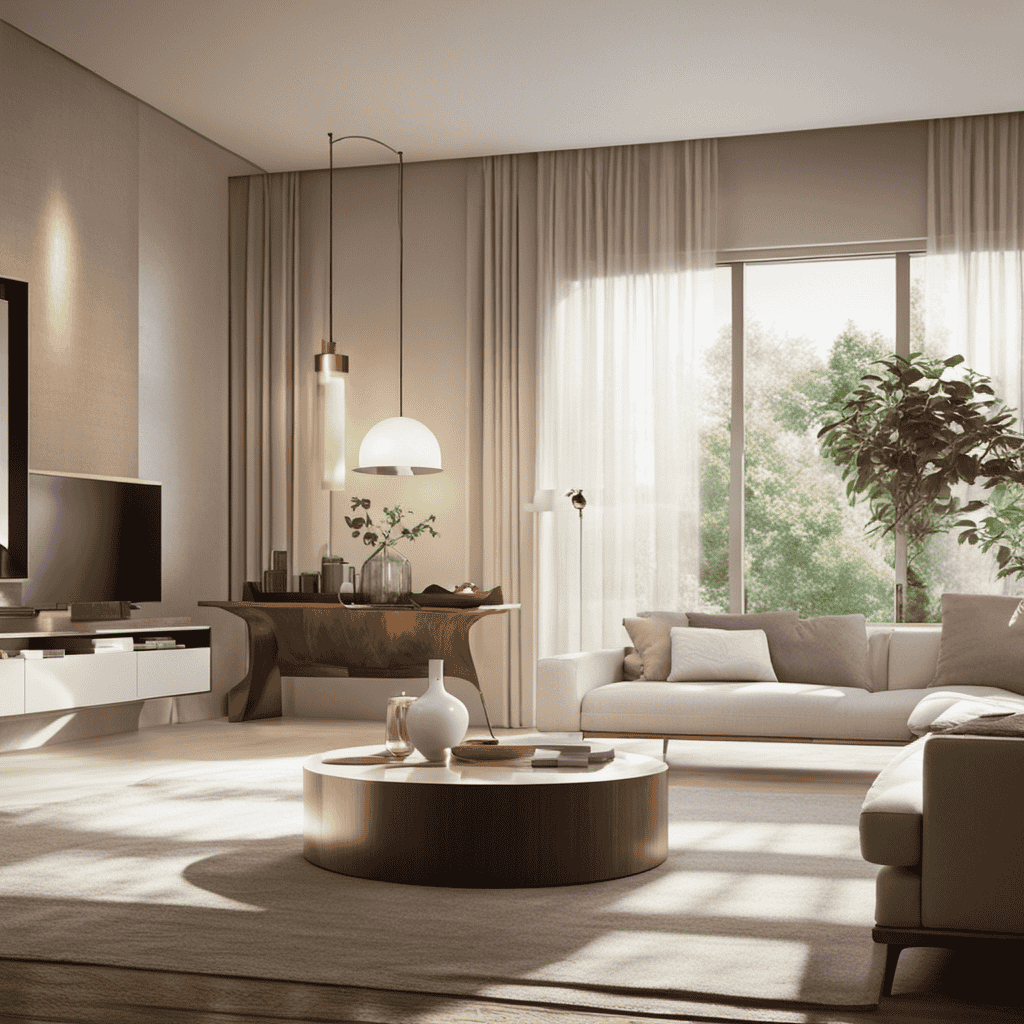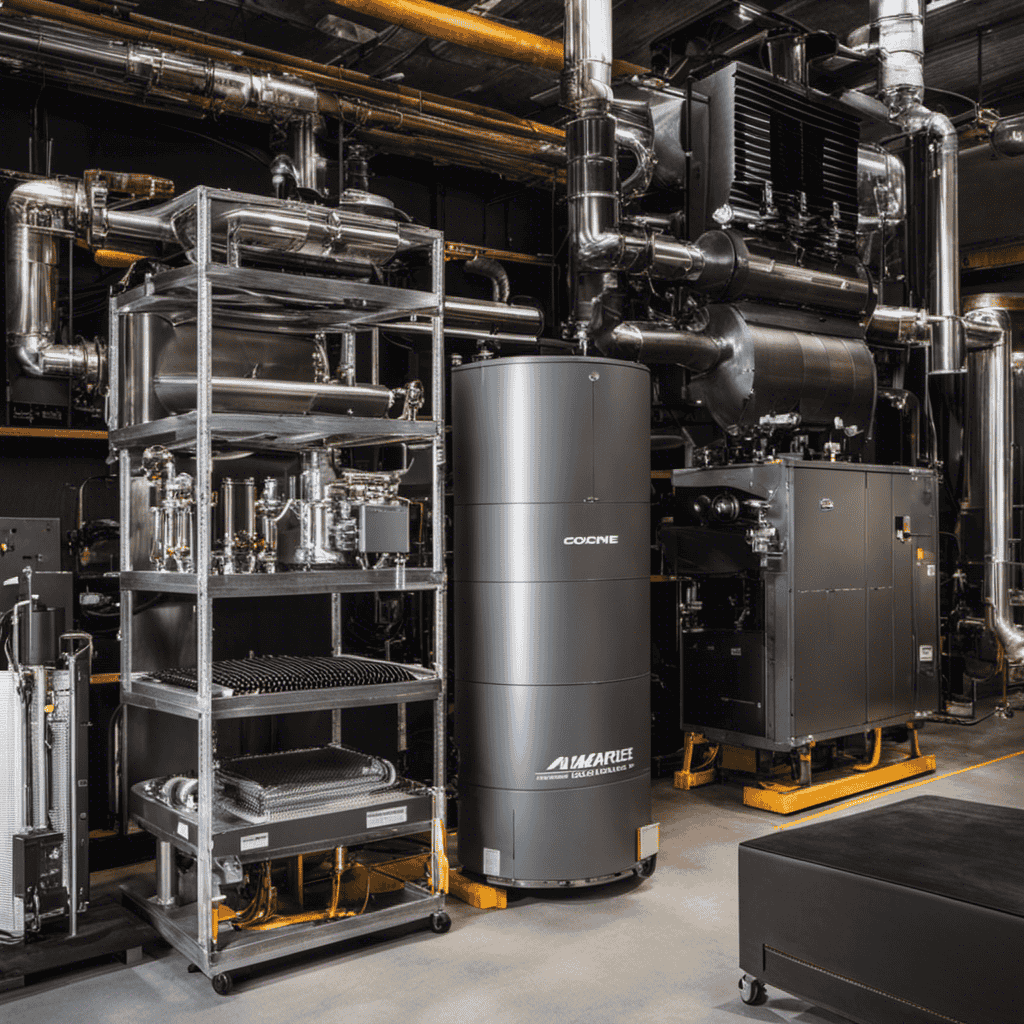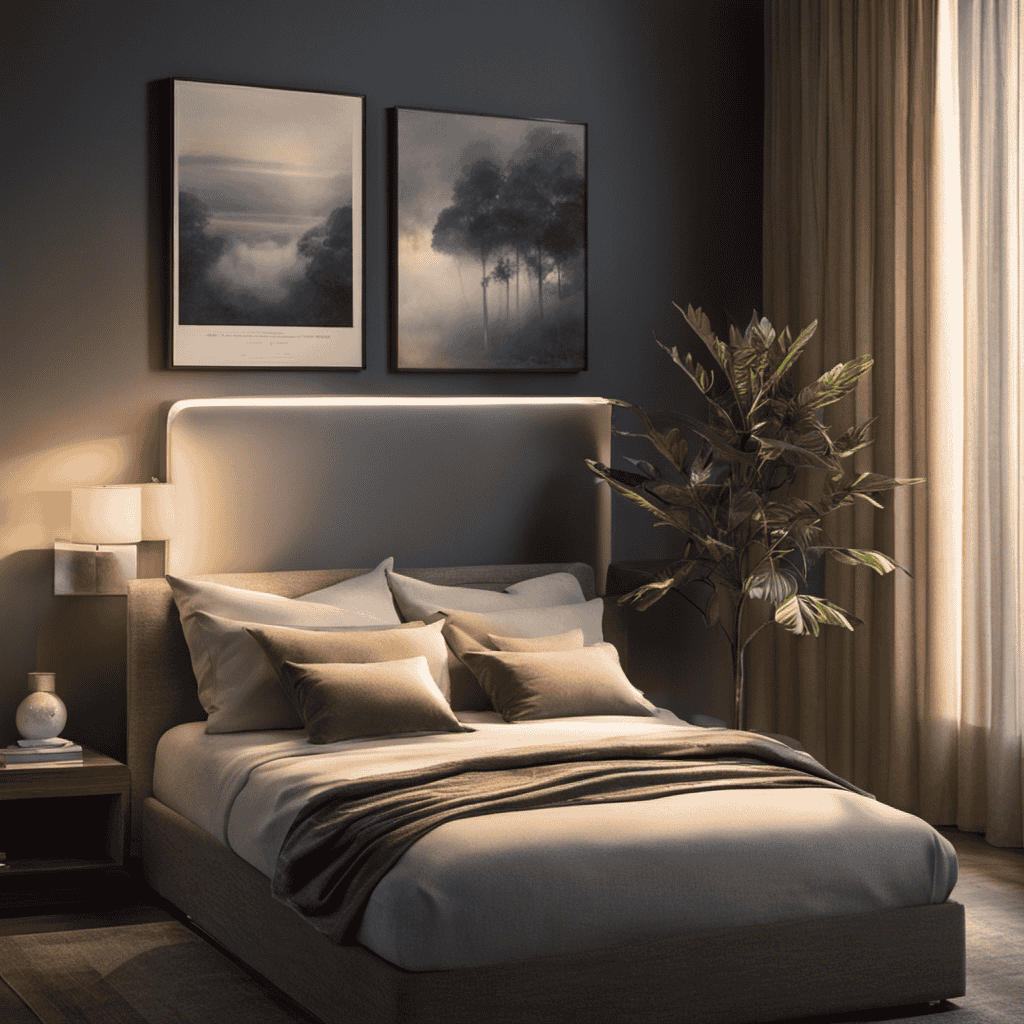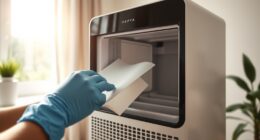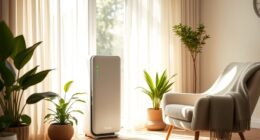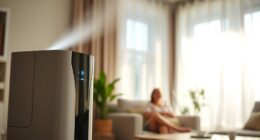As someone who owns a home, I understand the constant struggle of dealing with dust and allergens. But have you considered the hidden dangers present in the air? This is where air purifiers play a crucial role.
These powerful devices go beyond just removing dust and allergens, tackling the hidden dangers that can affect our health. In this article, I’ll explore how air purifiers can improve indoor air quality, address mold and bacteria, and reduce harmful VOCs and chemicals.
Get ready to breathe easier and create a healthier home environment.
Key Takeaways
- Poor indoor air quality is filled with pollutants like dust, pet dander, mold spores, and VOCs, which can cause respiratory issues and allergies.
- Air purifiers can effectively eliminate these invisible contaminants and improve indoor air quality, reducing the risk of health problems.
- Air purifiers can enhance respiratory health by reducing respiratory flare-ups, alleviating symptoms, and improving overall breathing.
- When choosing an air purifier, factors such as size, filtration system, noise level, optimal placement, energy efficiency, and maintenance should be considered for effectiveness and convenience.
Understanding the Invisible Threats in Your Home
I’ve been researching the invisible threats in my home and discovered the importance of understanding them. It’s easy to overlook these hidden dangers, but they can have a significant impact on our health and well-being. Identifying invisible contaminants is crucial in creating a safe and healthy living environment.

One of the main invisible threats in our homes is poor indoor air quality. We often think that the air inside our homes is clean, but the truth is, it can be filled with pollutants such as dust, pet dander, mold spores, and volatile organic compounds (VOCs). These contaminants can lead to respiratory issues, allergies, and even more severe health problems.
To understand and combat these invisible threats, it’s essential to educate ourselves about the potential sources of indoor air pollution and take necessary measures to improve air quality. Regular cleaning, proper ventilation, and the use of air purifiers are some effective ways to reduce the presence of these invisible contaminants in our homes.
The Impact of Indoor Air Pollution on Your Health
Exposure to indoor air pollution can have significant negative effects on my health. The impact of air pollution on my well-being can’t be underestimated. Here are three health risks associated with indoor air pollution:
Respiratory problems: Breathing in polluted air can lead to various respiratory issues such as asthma, bronchitis, and allergies. The pollutants present in the air, such as dust, smoke, and chemicals, can irritate the respiratory system and cause inflammation, leading to difficulty in breathing.

Cardiovascular diseases: Indoor air pollution is also linked to an increased risk of cardiovascular diseases. Fine particles and pollutants can enter the bloodstream through the lungs, causing inflammation and damage to the blood vessels. This can lead to the development of heart diseases, including heart attacks and strokes.
Compromised immune system: Prolonged exposure to indoor air pollution can weaken the immune system, making me more susceptible to infections, viruses, and illnesses. The pollutants in the air can suppress the immune response, reducing its ability to fight off diseases effectively.
It is crucial to take measures to improve indoor air quality and minimize the health risks associated with air pollution.
How Air Purifiers Can Improve Indoor Air Quality
Air purifiers are an essential tool in improving indoor air quality. They work by eliminating harmful pollutants such as dust, pollen, pet dander, and mold spores, which can trigger allergies and respiratory issues.
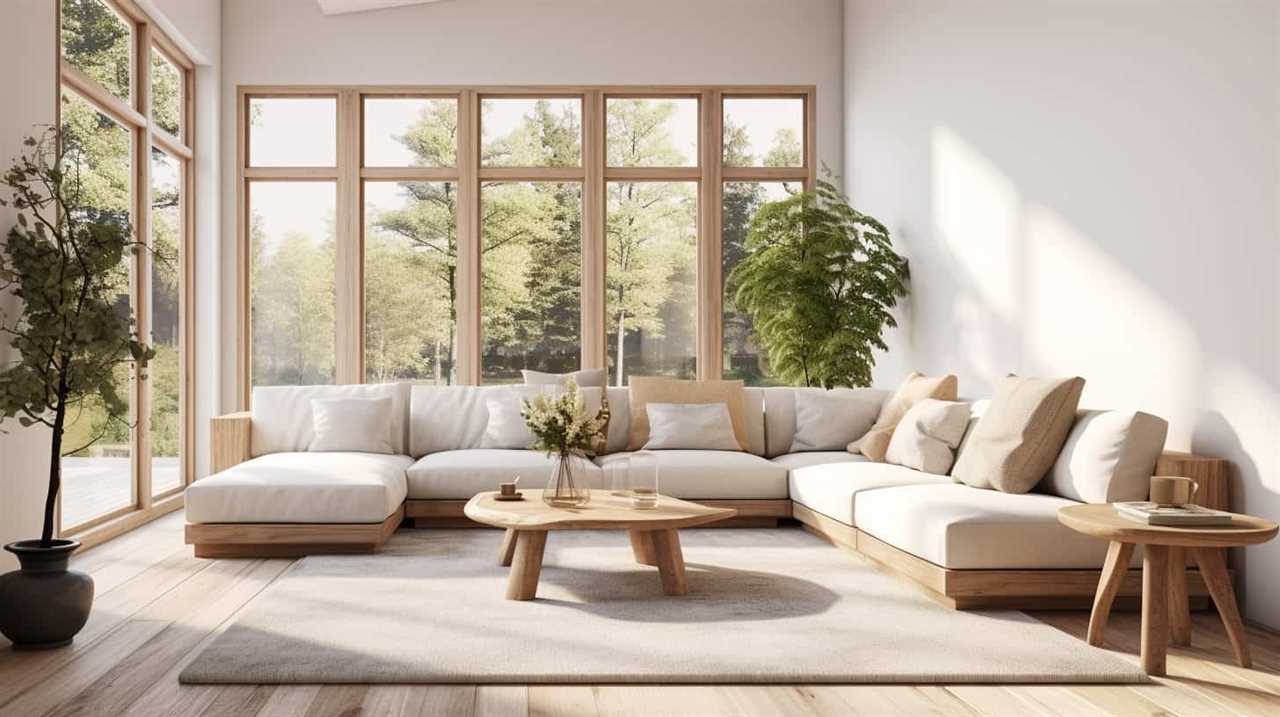
Eliminating Harmful Pollutants
My air purifier successfully removes harmful pollutants from my home, ensuring cleaner and healthier indoor air quality. Here are three ways it tackles these invisible threats:
Removing pet dander: As a pet owner, I know how frustrating it can be when pet dander triggers allergies or asthma symptoms. Thankfully, my air purifier effortlessly captures and eliminates pet dander particles, helping to alleviate these issues.
Reducing cigarette smoke: Even though I don’t smoke, occasionally visitors bring cigarette smoke into my home. Thanks to my air purifier’s powerful filtration system, it effectively reduces the presence of cigarette smoke particles, making the air fresher and healthier for everyone.
Eliminating other pollutants: From volatile organic compounds (VOCs) released by household products to airborne mold spores, my air purifier is designed to target and eliminate a wide range of harmful pollutants, ensuring that the air I breathe is clean and safe.
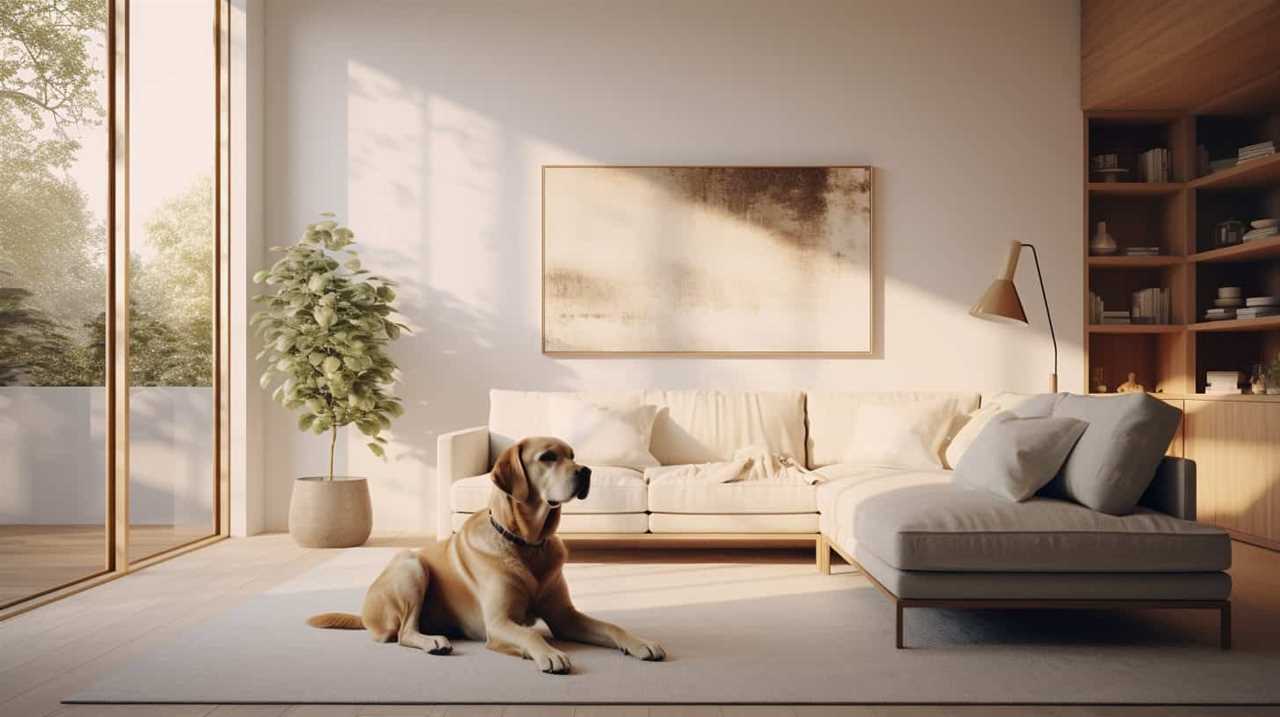
Enhancing Respiratory Health
Breathing in clean, filtered air has greatly improved my respiratory health, allowing me to enjoy a better quality of life. As someone who’s struggled with respiratory conditions and airway inflammation, I can attest to the transformative power of air purifiers.
These devices work by removing harmful pollutants and allergens from the air we breathe, creating a healthier indoor environment. By capturing and trapping microscopic particles such as dust, pet dander, and pollen, air purifiers reduce the risk of respiratory flare-ups and help alleviate symptoms.
The filtration process effectively reduces airway inflammation, making it easier to breathe and reducing the frequency of respiratory issues. With an air purifier in my home, I’ve noticed a significant decrease in coughing, wheezing, and shortness of breath. It has truly been a game-changer for my respiratory health.
Choosing the Right Air Purifier for Your Home
When selecting an air purifier, I consider factors such as size, filtration system, and noise level. These three aspects play a crucial role in determining the effectiveness and convenience of the device in my home.

Size: It’s important to choose an air purifier that’s suitable for the size of the room or area where it will be used. A small purifier may not be able to effectively clean the air in a large room, while a large purifier may be unnecessary and take up too much space in a smaller room.
Filtration system: Different air purifiers use different types of filters, such as HEPA filters or activated carbon filters. It’s important to consider the specific needs of my home and choose a purifier with a filtration system that can effectively remove pollutants such as dust, allergens, pet dander, and even odors.
Noise level: While air purifiers are designed to improve indoor air quality, they can sometimes produce noise that may be distracting or disruptive. Considering the noise level of an air purifier is crucial, especially if it will be used in a bedroom or a quiet space.
Effective Strategies for Using Air Purifiers in Your Home
When it comes to effectively using air purifiers in your home, there are a few strategies to keep in mind.
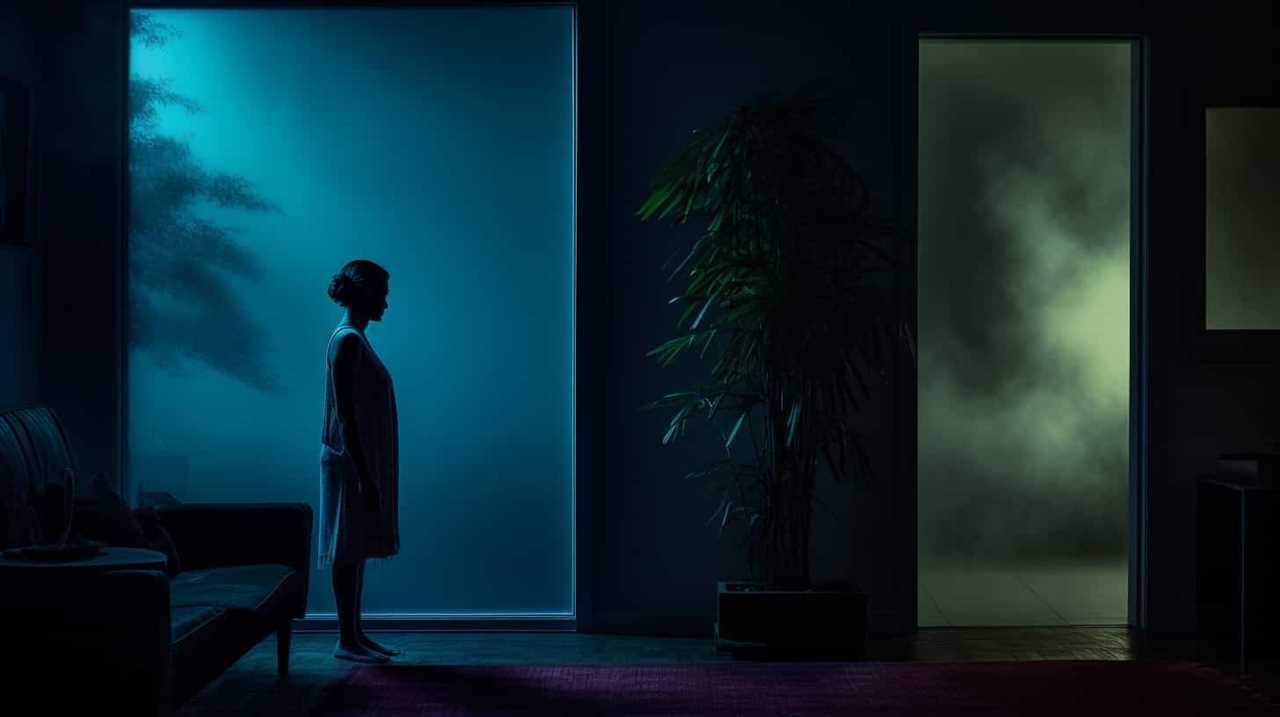
First, consider the optimal placement of your air purifier to ensure maximum effectiveness.
Additionally, regular maintenance is key to keeping your air purifier running at peak performance.
Optimal Placement for Effectiveness
To maximize the effectiveness of my air purifier, I position it in a central location within my home. Placing the air purifier in a central location allows for better air circulation and ensures that all areas of the home receive purified air.
Here are three common mistakes to avoid when placing an air purifier:

Placing it near walls or furniture: Air purifiers need space to intake and release air. Placing them too close to walls or furniture can obstruct airflow and reduce their efficiency.
Putting it in a corner: Corners tend to have stagnant air, making them poor locations for air purifiers. Instead, opt for a spot where air can easily flow around the purifier.
Placing it in a closed-off room: Air purifiers work best when placed in rooms with open doors or windows. This allows them to circulate air throughout the entire home and maximize their effectiveness.
When it comes to energy consumption, it’s important to choose an air purifier with an energy-efficient rating. This ensures that the purifier won’t significantly increase your energy bills while still effectively cleaning the air in your home.
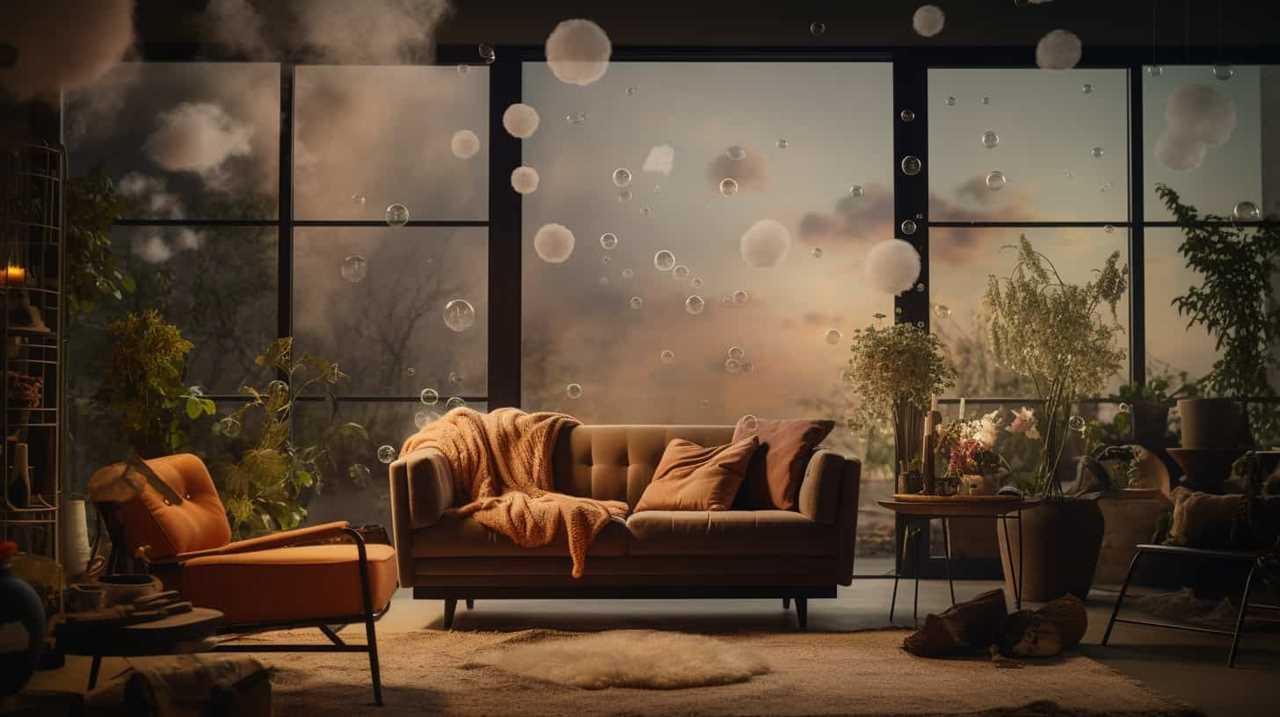
Maintenance for Peak Performance
I make sure to regularly clean the filters of my air purifier to ensure it functions at its peak performance. Cleaning the filters not only improves the air purifier’s efficiency but also extends its lifespan. There are different cleaning techniques depending on the type of filter used. For washable filters, I gently rinse them with water and let them dry completely before reinstalling. Replaceable filters should be replaced according to the manufacturer’s instructions. It is important to note that filters should be cleaned or replaced at least every 6 to 12 months, or more frequently if there are pets or smokers in the household. Neglecting filter maintenance can result in reduced air quality and decreased effectiveness of the air purifier. Here is a table summarizing the cleaning techniques and filter replacement recommendations:
| Filter Type | Cleaning Technique | Replacement Frequency |
|---|---|---|
| Washable | Rinse with water, air dry | Every 6-12 months |
| Replaceable | Follow manufacturer’s guide | Every 6-12 months |
Addressing Mold and Bacteria With Air Purifiers
Using an air purifier helps me tackle the invisible threats of mold and bacteria in my home. These tiny organisms can cause a range of health issues, from respiratory problems to allergies and infections. Here are three ways air purifiers can effectively address mold and bacteria:
HEPA Filtration: Air purifiers equipped with High Efficiency Particulate Air (HEPA) filters can capture and remove tiny particles as small as 0.3 microns, including mold spores and bacteria. These filters trap and immobilize these harmful organisms, preventing them from circulating in the air.
Activated Carbon Filters: Air purifiers with activated carbon filters are effective in removing odors, including those caused by mold and bacteria. These filters contain a highly porous carbon material that absorbs and neutralizes the odorous molecules produced by these organisms.

UV-C Technology: Some air purifiers use UV-C technology to kill mold spores and bacteria. UV-C light has germicidal properties that destroy the DNA of these microorganisms, preventing them from reproducing and spreading in your home.
The Role of Air Purifiers in Reducing VOCs and Chemicals
Equipped with advanced filtration technology, air purifiers play a crucial role in reducing VOCs and chemicals in my indoor environment. Not only do they eliminate dust and allergens, but they also tackle the invisible threats that can compromise the air quality in my home. One of the main concerns is odors, which can be caused by various sources such as cooking, pets, or even cigarette smoke. Air purifiers are effective in reducing these odors by filtering out the volatile organic compounds (VOCs) responsible for the unpleasant smells. Furthermore, air purifiers excel at filtering cigarette smoke, which contains harmful chemicals that can linger in the air and pose a risk to my health. The table below highlights the key benefits of air purifiers in reducing odors and filtering cigarette smoke.
| Reducing Odors | Filtering Cigarette Smoke | |
|---|---|---|
| Advanced Filtration | Yes | Yes |
| VOC Removal | Yes | Yes |
| Fresh Indoor Air | Yes | Yes |
| Improved Health | Yes | Yes |
With their ability to effectively reduce odors and filter cigarette smoke, air purifiers provide me with cleaner, fresher air to breathe, promoting a healthier indoor environment.
Can Air Purifiers Really Help with Tackling Invisible Threats in Your Home?
Yes, air purifiers can offer unconventional air purifier uses by helping to combat invisible threats in your home. They work to remove pollutants like dust, pet dander, and mold spores, which can lead to respiratory issues and poor indoor air quality. Investing in an air purifier can help create a healthier home environment.
Frequently Asked Questions
Can Air Purifiers Completely Eliminate All Indoor Air Pollutants?
No, air purifiers can’t completely eliminate all indoor air pollutants. While they’re effective in reducing the levels of dust and allergens in the air, there are other sources of indoor air pollution that may not be completely eliminated by an air purifier.

However, using an air purifier regularly and for the long term can significantly improve the air quality in your home and help reduce the presence of harmful pollutants.
Are There Any Potential Side Effects or Risks Associated With Using Air Purifiers?
When it comes to air purifiers, it’s important to consider any potential risks or health concerns. While they can be effective in removing pollutants and improving indoor air quality, there are a few things to keep in mind.
Some air purifiers emit ozone, which can irritate the lungs and worsen respiratory conditions. Additionally, if not properly maintained, air purifiers can become breeding grounds for bacteria and mold.
It’s crucial to choose a high-quality purifier and follow the manufacturer’s instructions for safe and effective use.
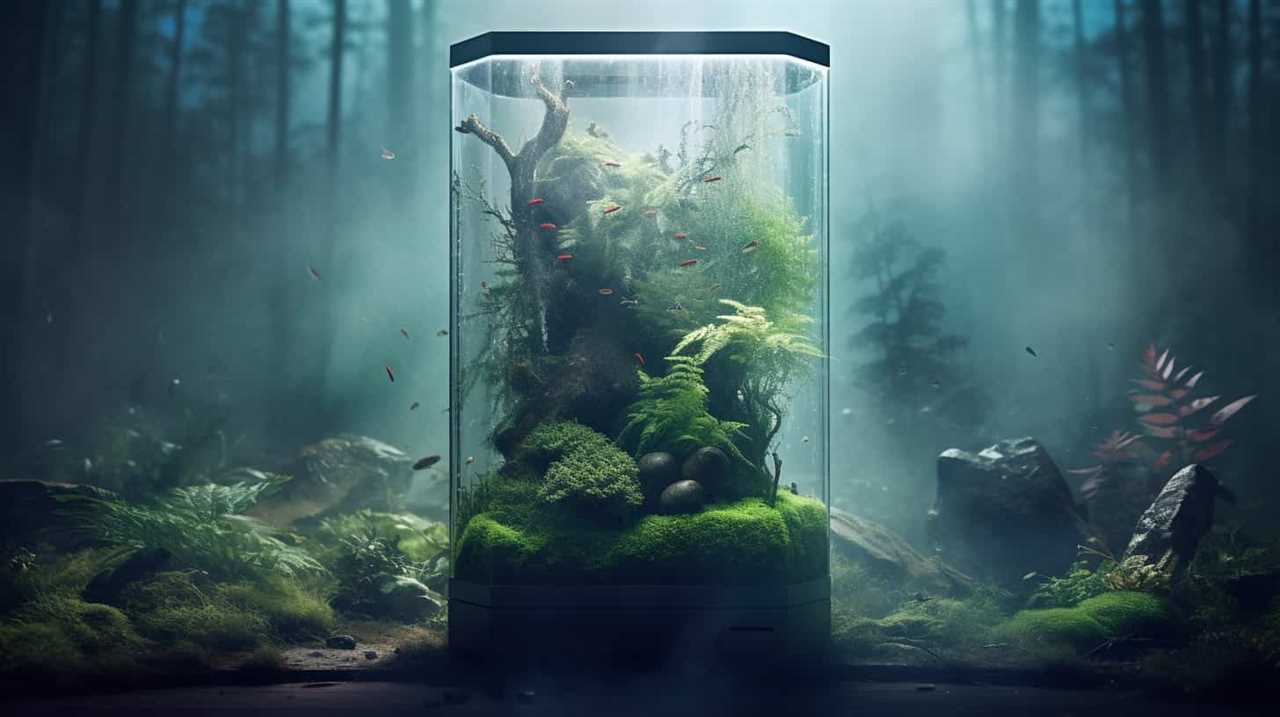
How Often Do Air Purifiers Need to Be Replaced or Serviced?
Air purifier maintenance is crucial to ensure optimal performance. Regularly replacing the filters is important, and the frequency depends on the specific model and usage. Signs of a malfunctioning air purifier include decreased airflow, unusual noises, and a lack of odor reduction.
It’s recommended to follow the manufacturer’s guidelines for servicing and replacing parts. By staying on top of maintenance, you can ensure that your air purifier continues to effectively tackle the invisible threats in your home.
Can Air Purifiers Help With Reducing Odors in the Home?
Yes, air purifiers can definitely help with reducing odors in the home. They’re designed to filter out particles and pollutants from the air, including pet odors and cooking smells.
The filters in air purifiers are effective in capturing and neutralizing these odors, leaving your home smelling fresh and clean.

Are There Any Specific Air Purifier Brands or Models That Are Recommended for People With Allergies or Respiratory Conditions?
When it comes to air purifiers for allergies or respiratory conditions, there are a few recommended brands that have proven effective.
One popular choice is the Honeywell True HEPA Allergen Remover, known for its ability to capture 99.97% of airborne particles.
Another option is the Blueair Classic 480i, which uses a combination of activated carbon and HEPA filtration to remove allergens and odors.
However, it’s important to consider the specific needs and budget before making a final decision.

Conclusion
In conclusion, air purifiers aren’t just for dust and allergens but also tackle the invisible threats lurking in your home. By improving indoor air quality, these devices can have a positive impact on your health.
Choosing the right air purifier and using it effectively can help address issues like mold, bacteria, and volatile organic compounds (VOCs). With their ability to reduce harmful substances, air purifiers play a crucial role in creating a safer and healthier environment for you and your loved ones.

